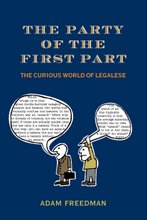Habeas Corpus
Habeas corpus is a writ (that is, a procedure) for challenging the legality of a prisoner’s detention. In contemporary American law, it refers to a procedure by which the constitutionality of a state conviction and imprisonment can be tested in federal court. The words literally mean “you have the body”; however, the original name for the writ was habeas corpus ad subjiciendum et recipiendum which (very) roughly translated, means, “you have the body, so bring him to court and we’ll decide whether he ought to be detained.” In old common law procedure, there were a number of “habeas corpus” writs, such as habeas corpus ad testificandum, which directed that a prisoner be deliver to a court to give evidence. The writ that we all know and love was sometimes called the Great Writ or the Writ of Liberty to distinguish it from all the others.
Like all writs, it's better with cheese on top.

2 comments:
I wonder how well habeus corpus would work as a pickup line in a bar. :)
It might go over well at a toga party. . .
Actually, in Laurie Moore's short story, "Willing," a Hollywood executive tells an actress "you have the body" and she replies "habeas corpus"!
Post a Comment